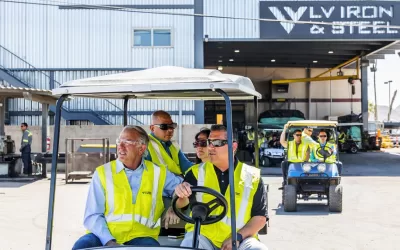Expanding a business often requires more than just a vision; it entails considerable financial backing to turn entrepreneurial dreams into reality. This is where programs like the Small Business Administration’s 504 loans come into play, providing a robust means for business owners to finance major fixed assets like real estate or expensive machinery. These loans are not only powerful due to their large lending amounts, which can go up to $5.5 million for certain projects, but they also offer favorable terms that can make repayment more manageable for small businesses aiming to bolster their growth and operations.
Understanding the intricacies of such financial tools is essential for any business looking to leverage them effectively. With the 504 loan program, businesses find themselves with the opportunity to secure long-term, fixed-rate financing at below-market rates, a boon for any company looking to expand without the burden of fluctuating interest rates. Through working with Certified Development Companies—nonprofits designed to support economic growth—businesses can navigate the complexities of this loan program and use it to finance their expansion projects in a way that aligns with the SBA’s goal of aiding small businesses in building a solid foundation for the future.
Key Takeaways From Unique Uses of SBA 504 Loans for Innovative Business Growth
- SBA 504 loans provide substantial funding for small businesses to purchase major fixed assets.
- Favorable loan terms facilitate the manageable growth and stability of small enterprises.
- Certified Development Companies assist with the application process and optimize the use of 504 loans.
Understanding SBA 504 Loans
The SBA 504 loan program is a powerful tool designed to support the growth and expansion of small businesses through long-term financing for major fixed assets. This section provides a detailed look at the essentials of the 504 Loan Program, its comparison to the SBA 7(a) Loan, and the key terms and rates involved.
Essentials of 504 Loan Program
The SBA 504 loan, administered by Certified Development Companies (CDCs), primarily aids small businesses in acquiring or improving major fixed assets, such as real estate or machinery. A typical structure of a 504 loan involves a partnership where 50% of the project cost is covered by a lender, 40% by a CDC backed by a 100% SBA-guaranteed debenture, and the remaining 10% is the borrower’s down payment. The focus of this program is on job creation or community development, and hence, it carries eligibility requirements including the business’s size and usage of the financed assets.
Comparing SBA 504 and 7(a) Loans
When distinguishing between an SBA 504 and an SBA 7(a) loan, one should note their purposes and structure. The 7(a) is a more general-purpose loan, suitable for a variety of business needs including working capital. An SBA 504, however, is specific for fixed assets. The interest rates on a 504 loan are typically lower and come with a fixed rate, while a 7(a) may offer both fixed and variable rates.
Key Terms and Rates
For those considering an SBA 504 loan, understanding the financial terms is critical. The interest rates are fixed for the life of the loan and are tied to the U.S. Treasury rates, making them highly competitive. The fees can include CDC servicing fees, SBA guarantee fees, and central servicing agent fees, but these are often included in the interest rate or the debenture. Terms can extend up to 25 years for real estate and 10 years for equipment, with down payment requirements typically ranging from 10% to 20%, depending on the business and the project.
These loans are designed for small to mid-sized businesses with the goal of promoting economic growth within their communities. It’s important for borrowers to assess their financial standing and project requirements to determine if the SBA 504 loan aligns with their business goals.
Eligibility and Application
The SBA 504 Loan program is designed to support the growth and development of small businesses in the United States, offering advantages like long-term, fixed-rate financing. To navigate the path to this financial resource, it’s imperative to understand the precise eligibility requirements and the structured application process.
Qualification Criteria
Eligibility: To qualify for an SBA 504 loan, it is essential that businesses meet specific criteria:
- Type of Business: The business must operate as a for-profit and fit the size standards established by the SBA.
- Net Worth and Income: The applicant business must showcase a tangible net worth of less than $20 million and an average net income of less than $6.5 million after federal income taxes for the two years preceding the application.
- Owner-Occupied Facilities: The assets financed by the loan, like buildings or equipment, need to be majority owner-occupied.
Criteria in Detail:
- Ownership: The applying business must be at least 51% owner-occupied for existing buildings or at least 60% for new constructions.
- Credit Score: A healthy credit score is necessary, although exact requirements can vary by lender.
Navigating the Application Process
When embarking on the application process, businesses should be ready to provide detailed information and undergo a thorough review:
- Initial Preparation: Businesses should begin by gathering necessary documentation, including financial statements, tax returns, and plans for usage of the loan.
- Lender Selection: Identifying a Certified Development Company (CDC) like NSDC is a critical step, as these are SBA’s community-based partners responsible for administering 504 loans.
- Official Application: Submit a formal application through the chosen CDC, which will review the proposal and creditworthiness.
- Approval and Closing: If approved, there are closing procedures to follow where legal documents are signed, and the loan is disbursed.
Process Overview:
- Timeline: The entire process from application to fund disbursement can typically take 60 to 90 days.
- Expectations: Transparent financial practices and a compelling case for how the loan will promote business growth and job creation are key to a successful application.
Maximizing Loan Benefits
The SBA 504 loan program offers specific advantages for businesses looking to invest in long-term assets. By accurately understanding these benefits, companies can make informed decisions regarding real estate and equipment investments.
Real Estate and Construction Advantages
The SBA 504 loan facilitates small businesses in acquiring commercial real estate and covering construction costs with favorable terms. Businesses can purchase land and buildings or undertake new construction. When renovating or expanding their premises, they must ensure that they will occupy at least 51% of the building. For new constructions, it rises to 60%. This ownership rule underscores the program’s focus on aiding businesses that operate out of the spaces they own.
- Acquisition: Businesses can acquire real estate such as land or existing buildings.
- Construction: Funding is available for constructing new facilities or renovating and expanding existing spaces.
- Long-term, fixed-rate financing: Locking in a low interest rate for up to 25 years.
Equipment and Asset Acquisition
Apart from real estate, the SBA 504 loan is invaluable for purchasing major fixed assets like heavy machinery which often have prohibitive upfront costs. The terms of the loan ensure that equipment essential for expanding business operations is more accessible.
- Heavy Machinery: Enables the purchase of heavy equipment, often necessary for scaling operations.
- Essential Assets: Covers a vast range of essential assets for business growth and operational efficiency.
- Down Payment: Lower down payments, increasing accessibility for small businesses.
Through strategic utilization of the SBA 504 loan, small businesses can significantly reduce the financial stress of large purchases and projects, thereby maximizing their potential for growth and expansion.
Strategic Funding and Repayment
The SBA 504 loan program stands out as a strategic funding solution for small businesses, focusing on long-term benefits and clear repayment terms to support significant growth and asset acquisition.
Financing Projects and Growth
SBA 504 loans are pivotal for small businesses seeking financing for major projects that spur economic growth. With loan amounts up to $5.5 million, these loans are especially beneficial for acquiring assets like land, buildings, or heavy equipment. Unlike other funding options, SBA 504 loans can cover up to 90% of project costs, providing substantial support for small businesses’ expansion plans.
- Maximum Loan Amount: $5.5 million
- Focus: Long-term asset growth
- Usage: Acquisition of land, real estate, equipment
Understanding Repayment Terms
Repayment terms for SBA 504 loans are designed with small businesses in mind, typically spanning 10 to 25 years based on the assets financed. This results in a fixed, monthly payment structure, reducing the stress of fluctuating expenses. Businesses can plan their finances with greater certainty, knowing the loan terms and repayment terms from the onset.
- Loan Term: 10, 20, or 25 years (based on assets financed)
- Repayment Structure: Fixed monthly payment
Frequently Asked Questions
Navigating the Small Business Administration’s 504 Loan Program can be complex. This section aims to clarify some of the most common inquiries potential borrowers have regarding the program’s specifics.
What are the eligibility requirements for an SBA 504 loan?
To qualify for an SBA 504 loan, a business must have a tangible net worth of less than $20 million and an average net income of less than $6.5 million after federal income taxes for the two years preceding the application. Furthermore, it should meet the SBA’s definition of a small business.
How do interest rates compare between SBA 504 and 7a loans?
SBA 504 loans commonly offer lower interest rates and longer repayment terms compared to SBA 7a loans. The 504 program’s interest rates are fixed for the life of the loan and tied to the market rate for U.S. Treasury issues, providing stability for the borrower.
Can SBA 504 loans be utilized for the purchase of commercial real estate?
Yes, SBA 504 loans are specifically designed to help small businesses purchase commercial real estate. This includes buying existing buildings or land, constructing new facilities, or renovating old ones, provided the properties are primarily owner-occupied.
What is the minimum down payment required for an SBA 504 loan?
Typically, the minimum down payment for an SBA 504 loan is 10% of the project cost. However, start-up businesses and single-purpose facilities may be required to contribute a higher percentage.
Are startups eligible to receive financing through an SBA 504 loan?
While it’s more challenging for startups to secure an SBA 504 loan due to lack of financial history, they can be eligible if they meet the program criteria, including the SBA’s requirements for management experience and feasibility of the business plan.
What types of properties qualify as owner-occupied for an SBA 504 loan?
For SBA 504 loans, a property qualifies as owner-occupied when the borrower’s business occupies at least 51% of the rentable property for existing buildings or 60% for new constructions. The property must also be used for business operations.



